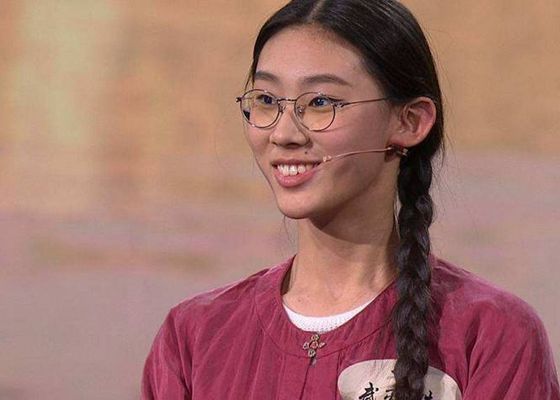Legacy of Chinese poetry revives
china.org.cn / chinagate.cn by Wu Jin, March 28, 2017 Adjust font size:
 |
|
Wu Yishu, winner of the second season of Chinese Poetry Conference. |
Having been ignored for the past few decades since China's modernization drive, the treasure trove of the Chinese ancient poetry is regaining mass appeal, thanks to the Chinese Poetry Conference, a reality show hosted by China Central Television in each of the past two years.
During its second season, Wu Yishu, a senior high school student from Shanghai, emerged as the winner among the contestants vying for the laureate offered by the conference.
Her composure and accomplishment impressed the audience and has since inspired people to reconsider the invaluable cultural heritage left by the genius of ancient Chinese poets.
"The ethereal beauty and integrity described in ancient Chinese poems are obviously ingrained deeply in her mind and heart, as revealed by her elegance with no traces of affectation," said Meng Man, one of the critics of the poetry conference and a deputy professor of Minzu University of China.
For most of Wu's contemporaries, ancient poetry is merely an extra book to be studied among piles of learning materials of math, physics and chemistry. Unlike her peers, however, Wu has no interest in current entertainment stars, but is immersed in the heroic spirit manifested by the beautiful poetry.
"Her reading presents her noble soul," said Meng.
Wu is not alone. Among the contestants there were generally no signs of aggressiveness, boldness and nervousness, as the people who joined the program did not strive for glory or fame, but for the enjoyment of their dedication to the aesthetic culture of the Chinese spirit.
"China is a nation of poetry and the people have an extraordinary affection for the cultural heritage that should always be cherished," said Li Shan, a professor from the School of Chinese Language and Literary of Beijing Normal University.
The reality show has stimulated a flurry of enthusiasm across the country for learning ancient Chinese poems, as schools begin to include more poems and essays created by ancient Chinese literati into their textbooks.
In response to the parents' questioning why schools spend so much time on a subject that can contribute only six marks to the full score of 150 in the Chinese section of the National Higher Education Entrance Examination, Huang Ronghua, a teacher in the High School Affiliated to Fudan University where Wu studies, said this represented a misinterpretation of the mission of education.
"The attempt to obtain the highest score possible with minimum cost of time and energy is actually distorting the modern pedagogic approach," Huang said.
"The pursuit of shortcuts creates disinterest among students, making them insensitive to the value of ancient Chinese works," the teacher added.
Following the Chinese Poetry Conference, the extracurricular classes of ancient Chinese literature have boomed as parents, expecting their children to grow up with the same sense of elegance and aura of success as Wu, start to send their children to the training centers for such activities.
However, experts have warned that the utilitarian purpose may smother children's eagerness for learning at an early age.
Jia Wei, deputy director of Shanghai Municipal Education Commission, said exposure to ancient Chinese poetry should not start too early in case children recite them mechanically.
"Children are supposed to be engaged in dialogues with their ancestors through poetry, from which they may upgrade their aesthetic appreciation and discover common ground for the unique cultural legacies," Jia said.